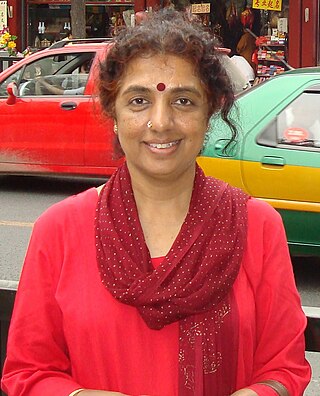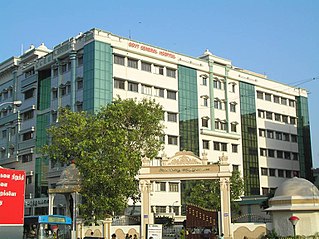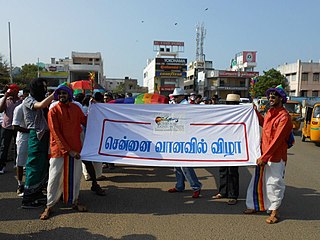Related Research Articles

The Mata Amritanandamayi Math (MAM) is an international charitable organization aimed at the spiritual and material upliftment of humankind. It was founded by Indian spiritual leader and humanitarian Mata Amritanandamayi in 1981, with its headquarters in Paryakadavu, Alappad Panchayat, Kollam district, kerala and is also known as amritpuri
Madras School of Social Work (MSSW) is an autonomous college located in Chennai, Tamil Nadu, India. Established in 1952. It is affiliated to the University of Madras and offers various under-graduate and graduate courses in social sciences. The college is ranked 73rd among colleges in India by the National Institutional Ranking Framework (NIRF) in 2024.

Tamil Nadu Police is the primary law enforcement agency of the state of Tamil Nadu, India. It is over 150 years old and is the fifth largest state police force in India. Tamil Nadu has a police-population ratio of 1:632. The Director General of the Tamil Nadu police is Shankar Jiwal.
World Vision India, headquartered in Chennai, is a christian charitable organisation, registered as a society under the Societies Registration Act of Tamil Nadu 1975. The organisation's primary stated goals are Child and Social Welfare.

The Department of Atomic Energy (DAE) is an Indian government department with headquarters in Mumbai, Maharashtra, India. DAE was established in 1954 with Jawaharlal Nehru as its first minister and Homi Bhabha as its secretary.
Nagarajan Vittal was an Indian civil servant who held a number of senior positions in the Government of India, most prominently that of central vigilance commissioner.

The Tamil Nadu Dr. M.G.R. Medical University is a government medical university situated in Guindy in the southern part of the city of Chennai, Tamil Nadu, India. It is about 7 km from the Chennai International Airport and about 13 km from the Chennai Central Railway Station. It is one of the premier medical universities in India, named after the former Chief Minister of Tamil Nadu MGR and it is the 2nd largest health sciences university in India.
Dr. A. D. S. N. Prasad is the founder of Pathway Centers for Children, a non-profit and non governmental organization located in Chennai and other rural parts of Tamil Nadu, India, that is dedicated to the welfare of children with mental handicap and those who are destitute or otherwise disadvantaged.
A municipal corporation is a type of local government in India which administers urban areas with a population of more than one million. The growing population and urbanization of various Indian cities highlighted the need for a type of local governing body that could provide services such as healthcare, education, housing and transport by collecting property taxes and administering grants from the state government.

Shoba Raja is an Indian psychologist and known for her work in developmental issues of vulnerable groups within the field of disability and mental health.

SBI Youth for India (SBI YFI) is an Indian rural fellowship programme initiated, funded and managed by the State Bank of India (SBI) in partnership with non-governmental organizations (NGOs). Fellows work with the NGOs on grassroot development projects.

Founded in 1999, Alliance India is a non-governmental organisation operating in partnership with civil society, government and communities to support sustained responses to HIV in India that protect rights and improve health. Complementing the Indian national programme, we build capacity, provide technical support and advocate to strengthen the delivery of effective, innovative, community-based HIV programmes to vulnerable populations: sex workers, men who have sex with men (MSM), transgender people, hijras, people who inject drugs (PWID), and people living with HIV.

Healthcare in Chennai is provided by both government-run and private hospitals. Chennai attracts about 45 percent of health tourists from abroad arriving in the country and 30 to 40 percent of domestic health tourists. The city has been termed Health Capital of India. Multi- and super-specialty hospitals across the city bring in an estimated 150 international patients every day. Factors behind the tourists' inflow in the city include low costs, little to no waiting period, and facilities offered at the speciality hospitals in the city.

MOHAN Foundation is a not-for-profit, registered non-government charity organisation in India that works in the field of deceased organ donation and transplantation. MOHAN is an acronym for Multi Organ Harvesting Aid Network.

The Nari Shakti Puraskar is an annual award given by the Ministry of Women and Child Development of the Government of India to individual women or to institutions that work towards the cause of women empowerment. It is the highest civilian honour for women in India, and is presented by the president of India on International Women's Day at Rashtrapati Bhavan in New Delhi. The award was instituted in 1999 under the title of Stree Shakti Puraskar, renamed and reorganised in 2015. It is awarded in six institutional and two individual categories, which carry a cash prize of 200,000 and 100,000 rupees, respectively.

The Chennai Rainbow Pride March has been held by members of Tamil Nadu LGBTIQA+ communities every June since 2009. The pride march is organised under the banner Tamil Nadu Rainbow Coalition, which is a collective of LGBT individuals, supporters, and organizations working on human rights and healthcare for the LGBTQIA community. The Pride March occurs on the final Sunday of June every year. The Pride March is usually preceded by a month-long series of events organized by NGOs and organizations to inculcate awareness and support for the LGBTQ community, such as panel discussions, film screenings, and cultural performances. The Chennai Vaanavil Suyamariyadhai Perani a.k.a. Chennai Rainbow Self-Respect March is known for being inter-sectional in nature as it addresses issues with multiple axes such as caste, class, religion coupled with gender discrimination.

Voluntary Health Services, popularly known as the VHS Hospital, is a multispecialty tertiary care referral hospital in the south Indian state of Tamil Nadu, reportedly serving the economically weaker sections of the society. It was founded in 1958 by Krishnaswami Srinivas Sanjivi, an Indian physician, social worker and a winner of Padma Shri and Padma Bhushan awards and is run by a charitable non governmental organization of the same name. The hospital is situated along Rajiv Gandhi Salai at Taramani, in Chennai.
The first case of the COVID-19 pandemic in the Indian state of Tamil Nadu was reported on 7 March 2020.

Negha Shahin (born 1993) is an Indian trans actress. Negha Shahin, who created history by becoming the first trans woman to win the debut actor award at the 52nd Kerala State Film Awards. She was born in Tamil Nadu, India.
References
- ↑ "The Banyan" . Retrieved November 24, 2024.
{{cite web}}: CS1 maint: url-status (link) - 1 2 "These Kerala rehabilitation homes help people with mental illness integrate into society". The News Minute. 2018-03-11. Retrieved 2018-05-25.
- ↑ Hamid, Zubeda (2017-09-16). "NHM to set up five mental healthcare and recovery centres". The Hindu. ISSN 0971-751X . Retrieved 2018-05-25.
- ↑ "Donors". thebanyan.org. Retrieved 2020-03-09.
- ↑ "Nari Shakti Puraskar | Ministry of Women & Child Development". wcd.nic.in. Retrieved 2020-03-09.
- ↑ "Welcome to Nehru Sidhant Kender Trust". www.nskt.org. Retrieved 2018-08-22.
- ↑ "The Banyan founder gets international award". The Times of India. October 3, 2012. Retrieved 2020-03-09.
- ↑ Sitaram Jindal Foundation Prize 2012, 3 December 2012, retrieved 2020-03-09
- ↑ "WHO India honours Public Health Champions". South-East Asia Regional Office. Retrieved 2018-08-22.
- ↑ "Vandana Gopikumar, a co-founder of a Chennai-based NGO to get Penn Nursing Renfield Award". The New Indian Express. Retrieved 2018-08-22.